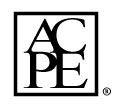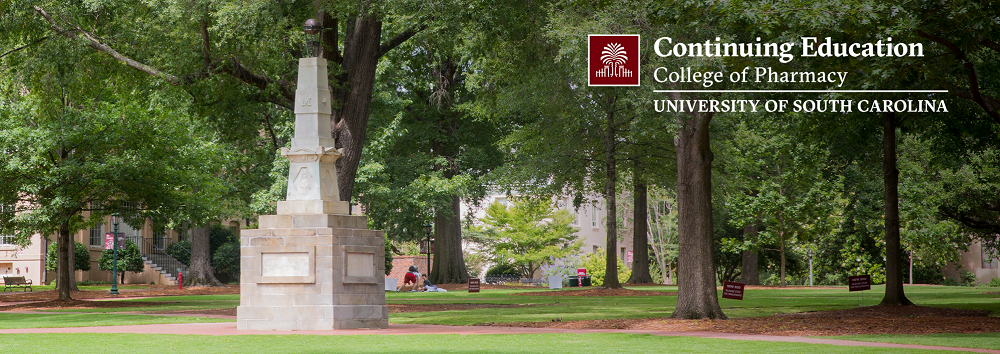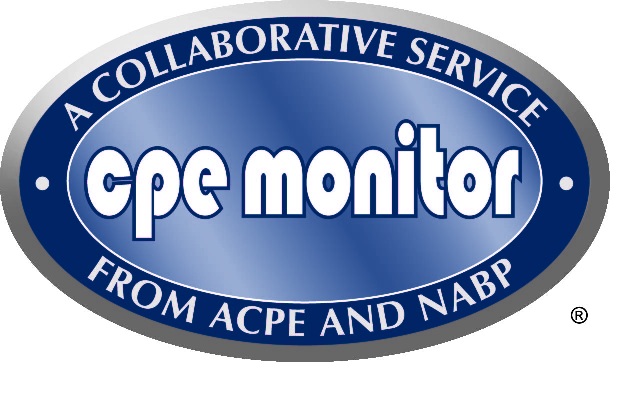- Effectively utilize cleanroom/hood certification reports to identify if a cleanroom is within a "state of control"
- Effectively develop and implement an environmental sampling plan
- Understand proper cleaning of the cleanroom environment
- Perform personnel competency assessment as outlined in USP <797>
- Effectively utilize tools to evaluate insourcing versus outsourcing when drug shortages arise.
Individuals attending the course in place of the registered individual will be honored as long as the request is made in advance of the registration deadline, which is 14 days prior to the start of the live component. Transfer participants must still complete the required prerequisite self-study at least 48 hours in advance of the live training.
Refund requests are subject to a $350.00 cancellation fee and must be received 30 days prior to the start of the live component. All registration cancellations must be submitted in writing or by e-mail to the Continuing Education Department at the following address.
Continuing Education
Email: ce@SCCP.sc.edu
 ACCREDITATION INFORMATION:
ACCREDITATION INFORMATION: 
- Correlate compounding mishaps with the evolution of sterile compounding regulation.
- Discuss the legal and regulatory players in the sterile compounding industry.
- Discuss the policy and procedure gap analysis process.
- Summarize how the primary and secondary engineering controls work together to contribute to the overall sterile compounding facility state of control.
- Analyze a certification report to identify key components and how to effectively utilize the information to maintain a “state of control” within the cleanroom environment.
- Design and implement an environmental sampling plan.
- Analyze material handling and personnel processes in a cleanroom in order to minimize particle generation and risk of contamination to the cleanroom environment and sterile compounds.
- Develop and implement a cleaning program that complies with USP <797> requirements.
- Analyze environmental sampling results to identify potential issues related to cleaning activities.
- Describe and document the required personnel competencies outlined in USP <797>.
- Evaluate personnel performing hand hygiene, garbing, and gloved fingertip sampling according to USP <797> requirements.
- Develop a media fill competency appropriate for various compounding risk levels.
- Discuss the use of automation in the sterile compounding process.
- Develop a process for quality release testing, batch testing, and assigning a beyond use date for sterile compounds.
- Evaluate the challenges of managing drug shortages and apply available tools to determine the appropriate use of outsourcing facilities versus insourcing for sterile compounding.
- Discuss the key highlights of USP <800> related to containment, personal protective equipment (PPE), and cleaning/decontamination.
- Identify the components of and implement a hazard communication plan.
|
Time
|
Session
|
Format
|
|
8:00 – 9:00
|
Welcome, Overview, Intro, Review of Regulatory Issues
|
Lecture
|
|
9:00-10:30
|
Engineering Controls
|
Lecture
|
|
10:30 – 10:45
|
Break
|
|
|
10:45-11:15
|
Engineering Controls – cont’d
|
Lecture
|
|
11:15 – 12:15
|
Environmental Sampling
|
Lecture
|
|
12:15 – 1:15
|
Lunch
|
|
|
1:15-3:15
|
Interactive Exercises
Lab tour – SCA/CAI, SECs, PECS
First Air – Smoke test
Particle generation and counts
Hood certifier report examples – how to interpret
Surface sampling and air sampling
Environmental sampling results – how to interpret
Corrective action plans
|
Lab
|
|
3:15-3:30
|
Break
|
|
|
3:30-4:15
|
Developing a Cleaning Plan
|
Lecture
|
|
4:15-5:15
|
Cleaning demo, documentation, and corrective action plans
|
Lab
|
|
5:15-5:30
|
Wrap-up – summary, observations
|
|
|
Time
|
Session
|
Format
|
|
8:00 – 8:15
|
Review of Day 1, Intro for Day 2
|
Lecture
|
|
8:15 – 9:00
|
Personnel Competencies (HH, PPE, GFS, MF)
|
Lecture
|
|
9:00 – 10:00
|
Developing Competency Plan – demo, PPE, personal assessment, documentation tools, Media Fill kits (PART 1)
|
Lab
|
|
10:00-10:15
|
Break
|
|
|
10:15-11:15
|
Developing Competency Plan – demo, PPE, personal assessment, documentation tools, Media Fill kits (PART 2)
|
Lab
|
|
11:15-12:15
|
Sterile to Sterile compounding, BUD determination, Quality release testing and automation
|
Lecture
|
|
12:15-1:15pm
|
Lunch
|
|
|
1:15-2:15pm
|
Nonsterile to sterile compounding, stability vs sterility testing, BUD determination, methods of sterilization and quality release testing
|
Lecture
|
|
2:15-3:15pm
|
Interactive Exercises (Part 1)
Filter sterilization exercise
Bubble point testing
Millipore phone app - demo
Batch testing/Sterile Compounding Case Scenario
Insourcing/Outsourcing
Managing drug shortages
|
Lab/
Exercises
|
|
3:15-3:30pm
|
Break
|
|
|
3:30 – 4:30pm
|
Interactive Exercises (Part 2)
Filter sterilization exercise
Bubble point testing
Millipore phone app - demo
Batch testing/Sterile Compounding Case Scenario
Insourcing/Outsourcing
Managing drug shortages
|
Lab/
Exercises
|
|
4:30-5:15
|
Overview/highlights of 800 – NIOSH alert, HCP, containment
|
Lecture
|
|
5:15 -5:30
|
Q&A, Session Wrap up
|
|
Date: May 23, 2016 08:00 AM - May 24, 2016 05:30 PM
Fee
CE Hours
CE Units
Registration closes on May 08, 2016 11:55 PM
Activity Type
- Certificate-Based
Target Audience(s)
- Pharmacists
- Pharmacy Technicians
Accreditation(s)

|
The University of South Carolina College of Pharmacy is accredited by the Accreditation Council for Pharmacy Education as a provider of continuing pharmacy education.
|
Requirements for CE Credit
Registration closes on May 08, 2016
at 11:55 PM
Registration Closed
1. Correlate compounding mishaps with the evolution of sterile compounding regulation.
2. Discuss the legal and regulatory players in the sterile compounding industry.
3. Discuss the policy and procedure gap analysis process
Speaker(s)/Author(s)
|
Nancy Roberts, PharmD, MS
|
Activity Number
0062-9999-16-069-L03-P/TCE Hours
Registration closes on May 08, 2016
at 11:55 PM
Registration Closed
Day 1:
• Summarize how the primary and secondary engineering controls work together to contribute to the overall sterile compounding facility state of control.
• Analyze a certification report to identify key components and how to effectively utilize the information to maintain a “state of control” within the cleanroom environment.
• Design and implement an environmental sampling plan.
• Analyze material handling and personnel processes in a cleanroom in order to minimize particle generation and risk of contamination to the cleanroom environment and sterile compounds.
• Develop and implement a cleaning program that complies with USP <797> requirements.
• Analyze environmental sampling results to identify potential issues related to cleaning activities.
Day 2:
• Describe and document the required personnel competencies outlined in USP <797>.
• Evaluate personnel performing hand hygiene, garbing, and gloved fingertip sampling according to USP <797> requirements.
• Develop a media fill competency appropriate for various compounding risk levels.
• Discuss the use of automation in the sterile compounding process.
• Develop a process for quality release testing, batch testing, and assigning a beyond use date for sterile compounds.
• Evaluate the challenges of managing drug shortages and apply available tools to determine the appropriate use of outsourcing facilities versus insourcing for sterile compounding.
• Discuss the key highlights of USP <800> related to containment, personal protective equipment (PPE), and cleaning/decontamination.
• Identify the components of and implement a hazard communication plan.
Speaker(s)/Author(s)
|
Carole Small Russell, RPh, MHSA
|
|
|
Kenneth Chase Parks
|
|
|
Nancy Roberts, PharmD, MS
|
|
|
Richard Capps, PharmD
|
|
|
Shay Garrison, RPh, MPH
|

